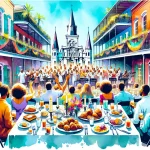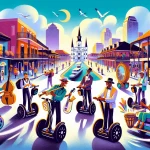The French Quarter Festival is an unparalleled annual celebration of New Orleans’ rich musical heritage and vibrant cultural scene. As the largest free music festival in the South, it attracts hundreds of thousands of visitors worldwide, showcasing the city’s exceptional musical talents, authentic cuisine, and artistic expressions. This four-day extravaganza significantly contributes to the local economy, generating millions in revenue for businesses throughout the French Quarter and beyond.
In This Article
TL;DR
- A premier music and cultural event in New Orleans, highlighting the city’s diverse musical genres and culinary delights.
- Holds significant cultural importance and economic impact, attracting vast crowds and generating substantial revenue.
- Offers a unique experience by featuring local musicians, authentic New Orleans cuisine, and free accessibility.
Historical Context and Evolution of French Quarter Fest
Initiated in 1984 to revitalize the French Quarter after a major revitalization project, the festival aimed to celebrate New Orleans’ unique culture and heritage while supporting local musicians and businesses. From humble beginnings as a local event, it has grown into a major international attraction, drawing music enthusiasts globally. A pivotal milestone was its expansion to a four-day event in the early 2000s, allowing for an even greater showcase of local talent and increased economic impact. While sharing similarities with other historic New Orleans music festivals like Jazz & Heritage, French Quarter Fest distinguishes itself through its focus on local musicians and its accessibility as a free event.
Core Elements of French Quarter Fest
The heart of French Quarter Fest lies in its celebration of New Orleans’ diverse musical genres, including jazz, R&B, gospel, classical, and funk. The festival features over 20 stages throughout the French Quarter, presenting more than 1,700 local musicians. Notable performances and headline acts over the years have included iconic New Orleans artists such as Irma Thomas, Kermit Ruffins, and the Preservation Hall Jazz Band. The festival’s commitment to showcasing local talent is evident in its lineup, featuring both established and up-and-coming artists from the New Orleans music scene. This focus helps preserve and promote the city’s unique musical heritage.
Cultural Significance and Community Impact
French Quarter Fest plays a vital role in preserving and celebrating New Orleans’ cultural heritage by showcasing the city’s music, food, and arts, helping to keep these traditions alive and introducing them to new generations of visitors. The event also has a significant economic impact, generating millions in revenue for businesses in the French Quarter and surrounding areas. Additionally, the festival supports community initiatives and outreach programs, such as providing educational opportunities for students interested in music and the arts, ensuring the cultural legacy is passed down.
Festival Logistics and Planning
The success of French Quarter Fest is due to the meticulous planning and organization by a dedicated team of staff and volunteers who ensure a smooth and enjoyable experience for attendees. The festival takes place throughout the French Quarter, with key locations including Jackson Square, the French Market, and the Old U.S. Mint. Visitors can navigate the festival grounds using the official app, which provides a map of stage locations, food vendors, and other attractions. For those traveling to New Orleans, there are numerous accommodation options available, and the organizers partner with local transportation providers to offer special rates and discounts.
Visitor Experience at French Quarter Fest
One of the most appealing aspects is the incredible variety of food and drink options available, with over 75 booths offering authentic New Orleans cuisine like gumbo and jambalaya, as well as innovative creations from up-and-coming chefs. In addition to music and food, the festival features art exhibits, craft vendors, and educational workshops, providing a well-rounded experience and a glimpse into the diverse cultural landscape of New Orleans. Festival veterans recommend arriving early, wearing comfortable shoes, bringing sunscreen and a reusable water bottle, and exploring beyond the main stages to discover hidden gems.
Technological Enhancements and Media Coverage
In recent years, French Quarter Fest has embraced technology to enhance the visitor experience and expand its reach. The festival’s mobile app provides real-time updates on performance schedules, food vendors, and attractions, making it easier for attendees to plan their day. The festival also maintains a strong social media presence, engaging with fans and sharing highlights, building a sense of community and attracting new audiences globally. Additionally, the festival garners significant media coverage from national and international outlets, furthering its promotion and showcasing New Orleans’ cultural richness.
Future Outlook and Sustainability Efforts
As French Quarter Fest continues to grow, the organizers are committed to ensuring its long-term sustainability and positive community impact. Key areas of focus include environmental sustainability initiatives to reduce waste, promote recycling, and minimize the festival’s carbon footprint. While exploring new ways to expand and enhance the event, such as adding new stages or thematic elements, the organizers face the challenge of managing growth while maintaining the festival’s authentic character and community focus. However, with its commitment to celebrating local music and culture, strong community support, and growing international reputation, the future of French Quarter Fest remains promising, poised to remain a beloved institution in New Orleans for years to come.






